Take the First Step For Estimate!
- Accurancy
- Efficiency
- Transparency
- Customization
- Time Saving
- Professionalism
- Cost Control
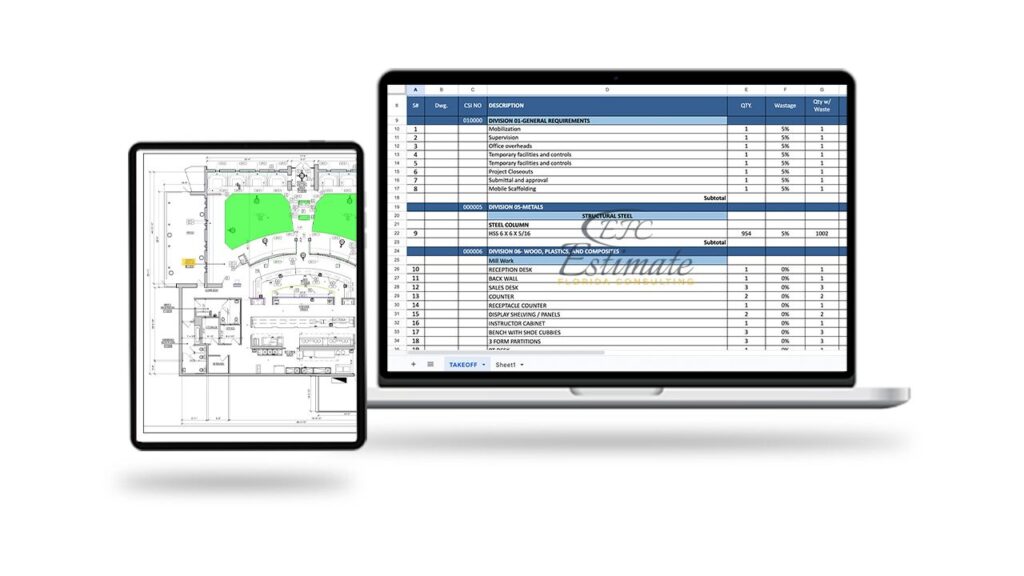
Estimate Florida Consulting specializes in delivering accurate electrical cost estimates tailored to the unique requirements of projects in Cape Canaveral. Electrical cost estimation is a crucial aspect of engineering and construction endeavors, serving as the financial roadmap for implementation. In the realm of electrical expenses, the spectrum varies widely: for smaller projects, estimates may fall within the range of $10,000 to $50,000, while mid-sized undertakings might entail costs ranging from $100,000 to $500,000. Larger industrial or commercial ventures could incur expenditures exceeding $1 million, escalating to $5 million or more for complex projects.
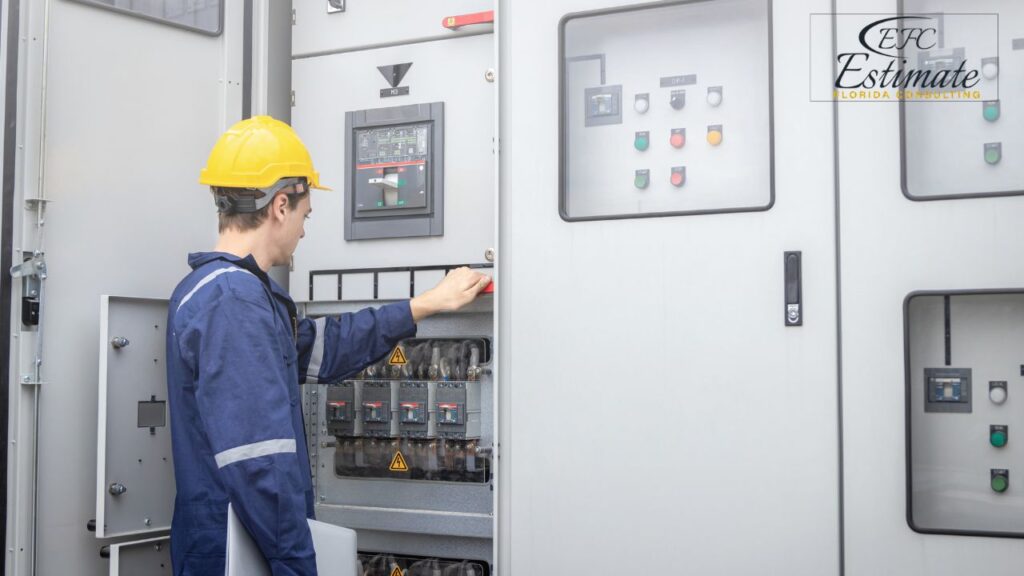
These estimates are contingent upon factors such as project scale, technical specifications, and local regulations, all of which are meticulously considered by our team to provide comprehensive and reliable estimates for our clients in Cape Canaveral.

Different types of electrical wiring systems cater to unique building and construction requirements. Lead-sheathed wiring, known for its durability, offers exceptional protection against harsh environmental conditions, which is ideal for more rigorous settings. Conduit wiring, meanwhile, features wires enclosed within a conduit, providing flexibility and simplified upkeep. These systems are designed to deliver electrical power safely and effectively within structures. The decision to use lead-sheathed versus conduit wiring will hinge on specific building regulations, project needs, and environmental demands, enabling contractors to tailor their choice to the particularities of each situation.
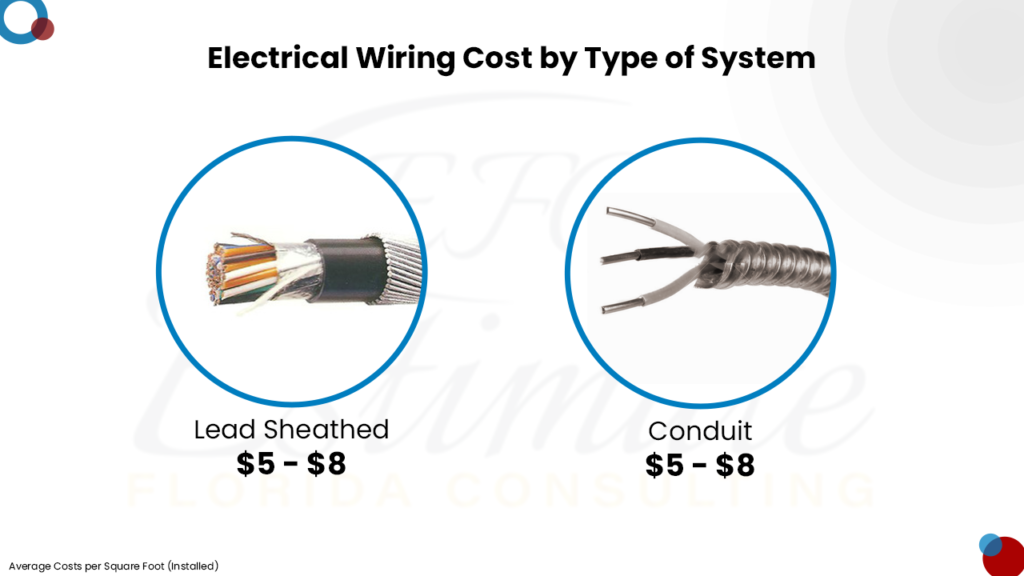
| WIRING SYSTEM | INSTALLED COST RANGE PER SQUARE FOOT |
|---|---|
| Lead Sheathed | $5 to $8 |
| Conduit | $5 to $8 |
Projects vary widely in size and scope, with electrical installations ranging from small-scale residential projects to large-scale industrial developments. Each category represents a different level of complexity and magnitude, influencing the estimated cost range.
Size of Project | Estimated Cost Range |
Small-scale Projects | $10,000 – $50,000+ |
Medium-scale Projects | $100,000 – $500,000+ |
Large-scale Projects | $1,000,000+ |
Industrial-scale Projects | $5,000,000+ |
Small-scale projects typically involve basic electrical upgrades for individual homes or small businesses. Medium-scale projects encompass larger residential properties or small to mid-sized commercial buildings, requiring more extensive wiring and system upgrades. Large-scale projects involve complex commercial or institutional buildings, including large retail spaces, office buildings, or educational facilities. Industrial-scale projects represent the most extensive ventures, encompassing industrial plants, manufacturing facilities, or large-scale infrastructure developments, necessitating robust electrical systems to support their operations. These cost ranges are approximate and may vary based on specific project requirements and local market conditions in Cape Canaveral.
Cape Canaveral, renowned for its pivotal role in space exploration, harbors a dynamic electrical industry that is as innovative as the spacecraft that launch from its shores. This industry plays a vital role in powering the infrastructure supporting space missions, as well as the diverse array of residential, commercial, and industrial developments across the region. From ensuring reliable electricity supply for mission control centers to designing efficient lighting systems for residential complexes, the electrical cost estimators in Cape Canaveral navigate a landscape where precision and reliability are paramount.
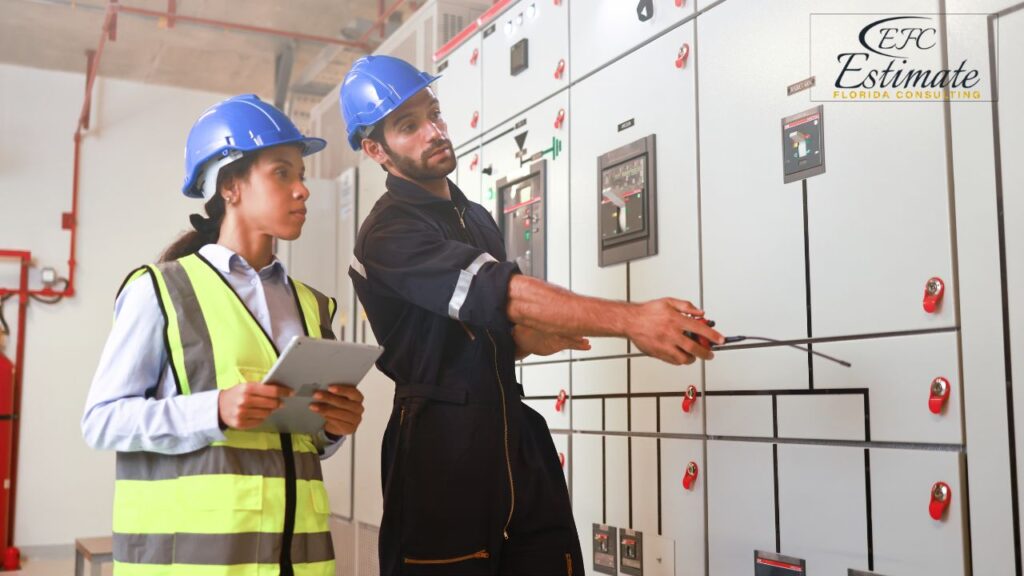
The significance of mission critical systems in Cape Canaveral cannot be overstated. These systems provide the backbone for space launch operations, requiring meticulous planning and execution to ensure uninterrupted power supply. Electrical cost estimators specializing in mission critical systems are tasked with assessing the unique requirements of each facility, from launch pads to command centers, to determine the cost of implementing robust electrical infrastructure capable of withstanding the rigors of space exploration. Their expertise lies in balancing performance, reliability, and cost-effectiveness to support the ambitious endeavors undertaken in Cape Canaveral’s spaceport.
In line with global efforts to transition towards sustainable energy sources, Cape Canaveral is witnessing a growing emphasis on renewable energy integration. Electrical cost estimators are at the forefront of this transition, evaluating the feasibility and cost implications of incorporating solar panels, wind turbines, and other renewable energy technologies into residential, commercial, and industrial projects. Their assessments consider factors such as site suitability, energy output projections, and return on investment, providing stakeholders with valuable insights to make informed decisions regarding sustainable energy adoption in Cape Canaveral.

Fully Insured License
Hire Sub-Contractor For Electrical Installation

Make Informed Design Decisions Showcase Your Design Ideas
Get RenderingBudgeting for electrical installations is crucial, with new builds typically incurring lower costs at $3 to $5 per square foot since wiring is integrated from the outset. Conversely, rewiring a house often entails higher expenses, from $6 to $10 per square foot, due to the challenges of modifying existing structures. These costs encapsulate the detailed work and labor required to ensure the electrical setup adheres to contemporary safety norms.
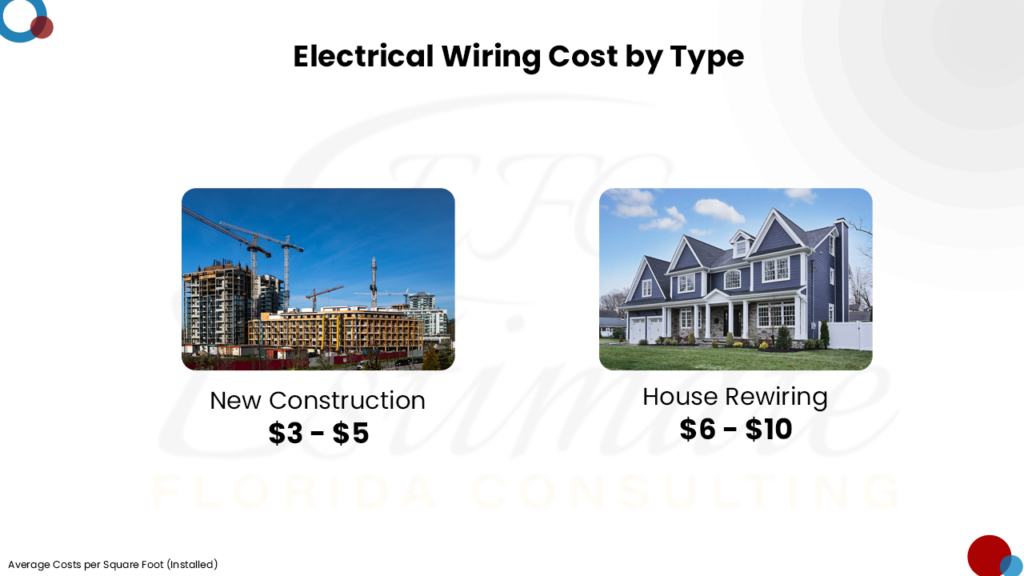
| WIRING TYPE | COST PER SQUARE FOOT (Installed) |
|---|---|
| New Construction | $3 to $5 |
| House Rewiring | $6 to $10 |
Given the critical nature of operations in Cape Canaveral, reliable emergency backup systems are essential to mitigate the impact of power outages or equipment failures. Electrical cost estimators specialize in assessing the requirements for backup power generation, whether through diesel generators, battery storage systems, or other alternative sources. Their calculations encompass factors such as load capacity, runtime duration, and redundancy levels, ensuring that emergency backup systems are robust enough to safeguard mission-critical operations against unforeseen disruptions.
As the concept of smart buildings gains traction, Cape Canaveral’s electrical industry is at the forefront of integrating cutting-edge technologies to enhance energy efficiency and occupant comfort. Electrical cost estimators evaluate the cost implications of implementing smart building solutions, such as advanced lighting controls, energy management systems, and IoT-enabled devices. By analyzing the upfront costs and long-term benefits of these technologies, they empower stakeholders to make informed decisions that align with sustainability goals while optimizing operational efficiency in Cape Canaveral’s built environment.
Navigating the complex landscape of electrical regulations and codes is a cornerstone of the electrical cost estimator’s role in Cape Canaveral. From adhering to building and safety codes to ensuring compliance with environmental regulations, these professionals possess a comprehensive understanding of the legal requirements governing electrical installations and infrastructure. By factoring in regulatory compliance considerations during cost estimation, they help minimize the risk of costly delays and ensure that projects in Cape Canaveral proceed smoothly from planning to completion, maintaining the highest standards of safety and quality.

The electrical cost estimation process in Cape Canaveral is influenced by a myriad of factors that encompass both technical and non-technical considerations. Understanding these factors is essential for accurately assessing the costs associated with electrical projects in this dynamic region.
The geographical and environmental characteristics of Cape Canaveral significantly impact electrical cost estimation. Factors such as soil composition, proximity to water bodies, and susceptibility to natural hazards like hurricanes can affect the design and installation of electrical infrastructure. Electrical cost estimators must account for these site-specific conditions to mitigate risks and ensure the longevity and reliability of electrical systems.
New projects are waiting for you.
Connect with more construction leads!

Cape Canaveral operates within a framework of regulatory standards and building codes governing electrical installations and safety. Compliance with these regulations is non-negotiable and represents a fundamental consideration in cost estimation. Electrical cost estimators must stay abreast of updates to codes and standards issued by organizations such as the National Electrical Code (NEC) and local authorities to accurately assess the costs associated with regulatory compliance.
The size, scale, and complexity of electrical projects vary widely in Cape Canaveral, ranging from residential installations to large-scale industrial developments. The intricacies of each project, including the number of circuits, types of equipment, and integration of advanced technologies, directly influence the cost estimation process. Electrical cost estimators must meticulously analyze the project scope and specifications to determine the resources and materials required, as well as the associated labor costs.
The availability and cost of materials and labor play a pivotal role in electrical cost estimation. Factors such as market demand, supply chain disruptions, and fluctuations in commodity prices can impact the overall cost of electrical projects in Cape Canaveral. Electrical cost estimators must conduct thorough market research and procurement analyses to accurately forecast material costs and negotiate competitive labor rates, ensuring cost-effective project execution.
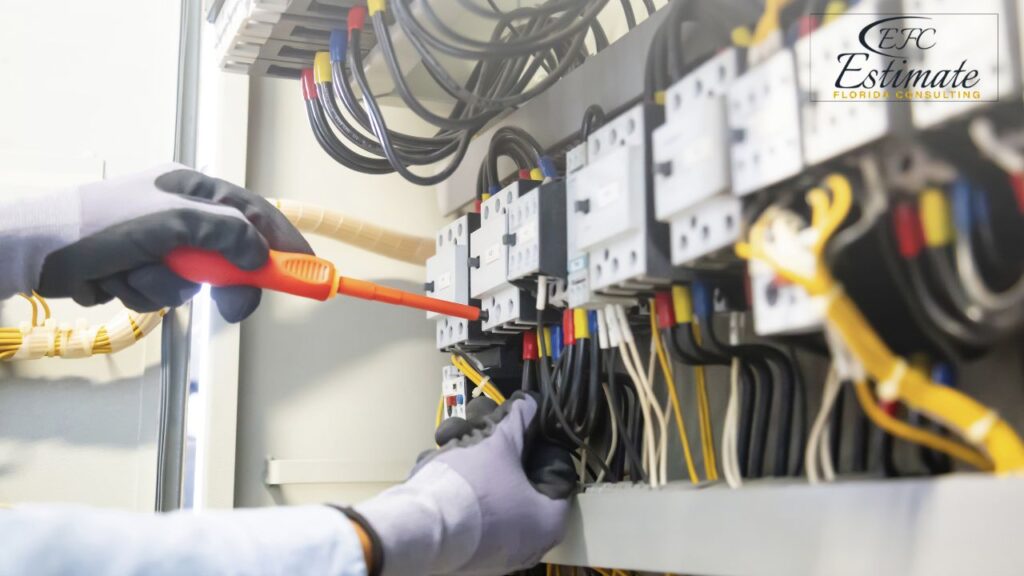
Advancements in electrical technologies, including smart building systems, energy-efficient equipment, and renewable energy solutions, are reshaping the landscape of electrical projects in Cape Canaveral. While these innovations offer opportunities to enhance efficiency and sustainability, they also introduce complexities and considerations that affect cost estimation. Electrical cost estimators must stay informed about emerging technologies and their implications for project costs, balancing the benefits of innovation with the associated expenses.
The timeline for completing electrical projects in Cape Canaveral is another critical factor influencing cost estimation. Tight deadlines, seasonal constraints, and scheduling conflicts can impact labor productivity and resource allocation, potentially affecting project costs. Electrical cost estimators must carefully assess project timelines and incorporate factors such as overtime expenses and expedited procurement into their cost estimates to ensure projects remain on schedule without compromising quality or budget constraints.
By considering these factors holistically, electrical cost estimators in Cape Canaveral can provide comprehensive and accurate estimates that align with the unique requirements and challenges of electrical projects in the region.
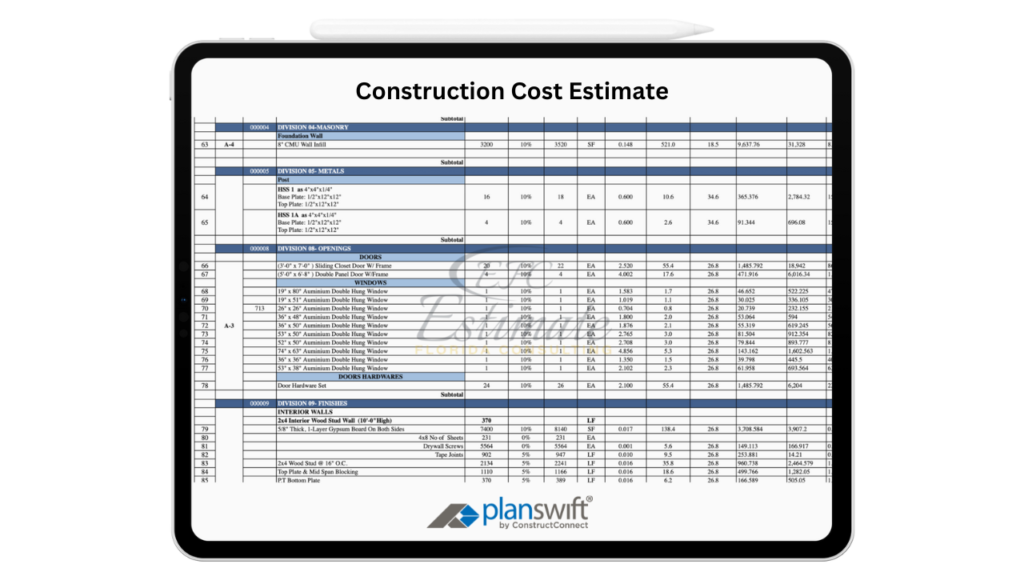
Electrical systems encompass a wide range of components and installations essential for powering various applications, from residential buildings to industrial facilities. Each system serves a specific function, contributing to the overall functionality and safety of the electrical infrastructure. Understanding the cost range associated with different electrical systems is crucial for budgeting and planning purposes in Cape Canaveral.
Electrical System | Cost Range |
Residential Wiring | $2,000 – $10,000+ |
Commercial Lighting | $5,000 – $50,000+ |
Industrial Control Systems | $10,000 – $100,000+ |
Renewable Energy Systems | $20,000 – $200,000+ |
Emergency Backup Systems | $50,000 – $500,000+ |
Data Center Infrastructure | $100,000 – $1,000,000+ |
High Voltage Transmission | $500,000 – $5,000,000+ |
Smart Building Technologies | $1,000,000 – $10,000,000+ |
Each electrical system comes with its unique cost considerations, influenced by factors such as complexity, scale, and technological advancements. By understanding the cost range associated with these systems, stakeholders in Cape Canaveral can make informed decisions when planning electrical projects to meet their specific needs and budget constraints.
The prices of electrical materials can be volatile due to factors such as market demand, supply chain disruptions, and fluctuations in commodity prices. Estimators often struggle to accurately predict these costs, leading to budgetary uncertainties.
Solution: Implementing strategic procurement practices, such as bulk purchasing agreements or long-term contracts with suppliers, can help mitigate the impact of fluctuating material costs. Additionally, regularly monitoring market trends and establishing contingency plans for cost adjustments can enhance cost estimation accuracy.
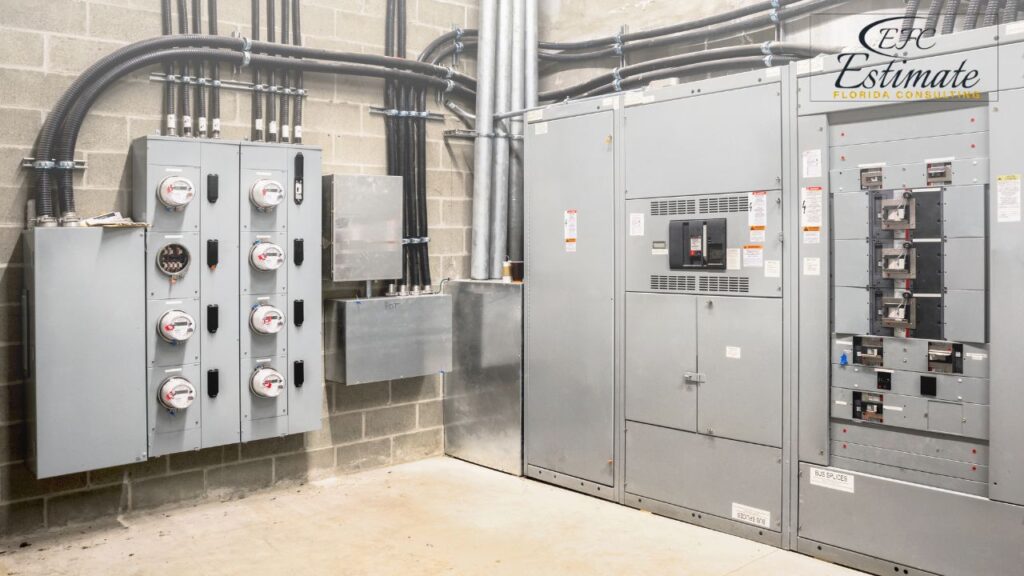
The rapid evolution of electrical technologies and building codes presents a challenge for cost estimators, as staying updated with the latest advancements and regulatory requirements is essential for accurate estimation. Failure to account for these changes can result in underestimation or overestimation of project costs.
Solution: Continuous education and training programs for estimators to stay abreast of technological advancements and code updates are crucial. Collaborating with industry experts and participating in professional forums can provide valuable insights into emerging technologies and regulatory changes, enabling more accurate cost estimation.
Finding skilled labor with expertise in electrical installations can be challenging, particularly during peak construction periods or in niche areas of specialization. Labor shortages or skill gaps can lead to delays and increased labor costs, impacting project budgets.
Solution: Developing relationships with reputable electrical contractors and subcontractors in Cape Canaveral can help mitigate labor-related challenges. Investing in workforce development initiatives, such as apprenticeship programs or training partnerships with vocational schools, can also ensure a steady supply of skilled labor and foster the growth of the local electrical workforce.
Scope creep, or the gradual expansion of project requirements beyond the initial scope, is a common challenge in electrical projects. Unforeseen changes or client requests can lead to additional work and costs that were not accounted for in the original estimate.
Solution: Establishing clear communication channels and documentation protocols from the outset of the project can help mitigate scope creep. Implementing robust change management processes, including thorough review and approval procedures for change orders, can ensure that any deviations from the original scope are properly assessed and accounted for in cost estimates.

Why delay? Share your project plans with us and give us a call today. We’re eager to help you make your project a resounding success!
Cape Canaveral’s unique environmental conditions and stringent regulatory requirements pose challenges for electrical cost estimators. Ensuring compliance with environmental regulations and obtaining permits for electrical installations can add complexity and costs to projects.
Solution: Engaging with regulatory agencies and environmental consultants early in the project planning phase can help identify potential compliance issues and ensure that all necessary permits are obtained. Integrating environmental sustainability principles into project design and construction practices can also help mitigate environmental impacts and reduce regulatory compliance costs over the long term.
The electrical cost estimation process in Cape Canaveral is a comprehensive and methodical approach that involves several key steps to ensure accuracy and reliability. Here’s an overview of the essential stages involved:
The first step in the electrical cost estimation process is to conduct a thorough assessment of the project requirements, scope, and specifications. This involves reviewing architectural and engineering plans, understanding the electrical needs of the project, and identifying any unique challenges or constraints. By gaining a comprehensive understanding of the project parameters, stakeholders can lay the groundwork for an accurate cost estimation process.
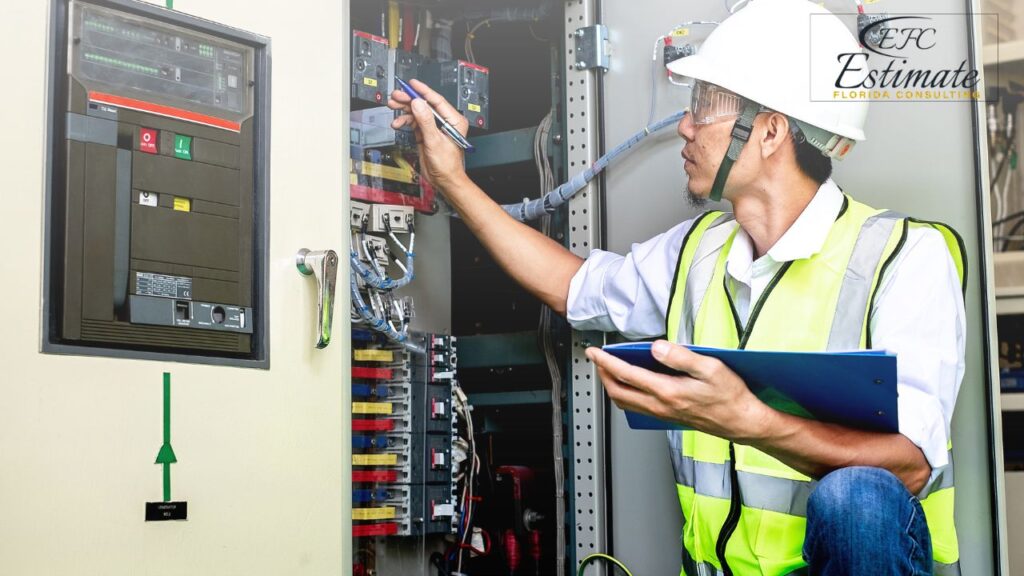
Once the project assessment is complete, the next step is to gather relevant data and information necessary for cost estimation. This includes obtaining pricing information for materials, labor rates, equipment rentals, and any other resources required for the project. Additionally, historical data from similar projects and industry benchmarks may be collected to inform the estimation process and ensure accuracy.
With the necessary data in hand, a preliminary cost estimation is developed to provide stakeholders with an initial overview of the project’s budgetary requirements. This estimate serves as a baseline for further refinement and analysis throughout the estimation process. Preliminary cost estimation involves outlining the major cost components, such as materials, labor, subcontracting, and overhead, based on the project scope and requirements.

Following the preliminary estimation, a detailed cost analysis is conducted to refine and validate the initial estimate. This involves breaking down the project into smaller tasks or work packages and analyzing each component individually. Detailed cost analysis may include quantifying materials, calculating labor costs based on project timelines and resource allocation, and factoring in any contingencies or risk factors.
Once the detailed cost analysis is complete, adjustments and optimizations may be made to the cost estimate based on various factors. This may include revising material quantities based on updated project specifications, negotiating better pricing with suppliers and subcontractors, or exploring alternative approaches to optimize cost-effectiveness without compromising quality or safety.
Finally, the cost estimation process culminates in the preparation of comprehensive documentation and reports outlining the estimated costs for the project. This documentation is typically presented to stakeholders for review and approval and serves as a basis for budgeting, resource allocation, and decision-making throughout the project lifecycle. Clear and transparent reporting ensures that all stakeholders are informed and aligned regarding the projected costs and enables effective project management and control.
By following these steps diligently, electrical cost estimators in Cape Canaveral can develop accurate and reliable estimates that support successful project execution and delivery.
The electrical cost estimation process in Cape Canaveral is a multifaceted and rigorous endeavor that requires careful planning, analysis, and attention to detail. From initial project assessment to detailed cost analysis and documentation, each step in the estimation process plays a crucial role in ensuring accuracy and reliability. Despite the challenges posed by fluctuating material costs, evolving technology, and regulatory requirements, electrical cost estimators in Cape Canaveral leverage innovative solutions and best practices to navigate these complexities effectively. By employing advanced software, leveraging industry networks, and staying abreast of technological advancements and regulatory changes, estimators can develop comprehensive estimates that support informed decision-making, optimize resource allocation, and contribute to the successful execution of electrical projects across the region. Through collaboration, continuous learning, and a commitment to excellence, stakeholders in Cape Canaveral can confidently rely on accurate cost estimates to drive project success and deliver high-quality electrical infrastructure that meets the needs of the community now and in the future.
Labor costs in electrical cost estimation are typically determined based on factors such as project complexity, skill level required, prevailing wage rates in the region, and project duration. Estimators may also consider factors like union labor agreements, overtime rates, and subcontractor costs when calculating labor expenses.
Several factors can impact the accuracy of electrical cost estimates, including fluctuations in material prices, changes in project scope, unforeseen site conditions, regulatory requirements, and labor availability. Estimators must carefully assess these factors and incorporate appropriate contingencies to account for potential variations and uncertainties.
Electrical cost estimators in Cape Canaveral ensure compliance with building codes and regulations by staying updated with local, state, and national codes governing electrical installations. They collaborate closely with engineers, architects, and regulatory authorities to interpret and apply relevant codes correctly, ensuring that cost estimates align with regulatory requirements and standards.
Sustainability considerations increasingly influence electrical cost estimation, particularly in Cape Canaveral, where environmental consciousness is a priority. Estimators may factor in the cost of implementing energy-efficient technologies, renewable energy systems, and sustainable practices to minimize environmental impact and achieve long-term cost savings for clients.
Electrical cost estimates serve as valuable tools for stakeholders in Cape Canaveral to make informed decisions about project planning and budgeting. By providing a detailed breakdown of anticipated costs, estimates enable stakeholders to assess project feasibility, allocate resources effectively, secure funding, and negotiate contracts with confidence. Additionally, cost estimates serve as benchmarks for monitoring project progress and controlling expenses throughout the project lifecycle.
Here I am going to share some steps to get your metal cost estimate report.
You can send us your plan on info@estimatorflorida.com
Before starting your project, we send you a quote for your service. That quote will have detailed information about your project. Here you will get information about the size, difficulty, complexity and bid date when determining pricing.
Our team will takeoff and estimate your project. When we deliver you’ll receive a PDF and an Excel file of your estimate. We can also offer construction lead generation services for the jobs you’d like to pursue further.



561-530-2845
info@estimatorflorida.com
Address
5245 Wiles Rd Apt 3-102 St. Pete Beach, FL 33073 United States
561-530-2845
info@estimatorflorida.com
Address
5245 Wiles Rd Apt 3-102 St. Pete Beach, FL 33073 United States
All copyright © Reserved | Designed By V Marketing Media | Disclaimer